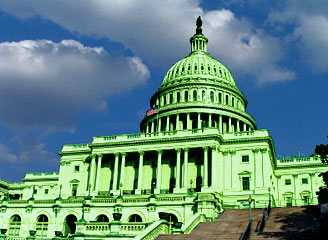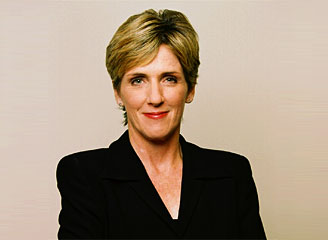 Track the debate and take action >>>
Track the debate and take action >>>
UPDATED: 16 Sep 2009
President Barack Obama’s key advisers on energy and climate issues include a former top aide to Al Gore, a Nobel Prize winner, a governor, and a gaggle of former members of Congress. Here’s a rundown:
 Carol Browner
Carol Browner
Assistant to the President for Energy and Climate Change
Browner serves as a special adviser to the White House on climate and energy, a new role Obama created to work on an issue he has defined as one of his top concerns. Browner has been keeping a low profile in Washington, offering very few on-the-record interviews and not receiving as much of the limelight as other administration players, though it’s clear her role in coordinating policy within the administration is major. She’s at the table during economic discussions, and was the key negotiator hashing out a new deal on automobile emissions.
Browner served as Florida’s secretary of the environment from 1991 to 1993, and was a top aide to Al Gore when he was in the Senate. She served as EPA administrator during the entire Clinton administration, and later served as a principal in The Albright Group LLC, a global strategy firm lead by former Secretary of State Madeleine Albright, as well as Albright Capital Management.
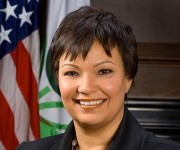 Photo: epa.govLisa Jackson
Photo: epa.govLisa Jackson
Administrator of the Environmental Protection Agency | epa.gov
During her first months on the job, Lisa Jackson has made significant headway on several climate issues that the Bush administration EPA refused to take up. Within days of taking office, Jackson announced that the agency was beginning the process of reevaluating whether California and other states should be able to set their own higher standards for automobile emissions; the administration has now adopted those standards nationwide. She also moved the agency forward on regulating planet-warming emissions by declaring that they do, in fact, pose a threat to public health and welfare.
Jackson has been adamant that the EPA will move forward on regulating emissions under the Clean Air Act if Congress doesn’t pass a climate bill this year, telling reporters, “The race is clearly on.” But she has also maintained that the administration would prefer new legislation, and has encouraged Congress to deliver it.
Jackson came to the Obama administration from the New Jersey Department of Environmental Protection, which she lead from February 2006 to November 2008. Enviros in the state gave her mixed reviews, though national green leaders cheered her appointment to the post.
Watch a video interview with Jackson by Grist’s Amanda Little.
 Steven Chu
Steven Chu
Secretary of Energy | energy.gov
Steven Chu, a Nobel laureate physicist who came to the administration from a post at the head of the Lawrence Berkeley National Laboratory, has made some ambitious moves in his first months in office. Greens swooned when he called coal his “worst nightmare,” but he hasn’t been quite as much of a rabble-rouser in office.
Among his biggest accomplishments so far have been streamlining the loan guarantee process at DOE and initiating new partnerships with other departments to improve energy efficiency. He also scored a win in securing funding for the Advanced Research Projects Agency-Energy (ARPA-E).
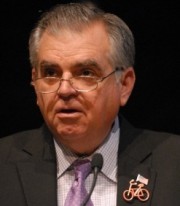 Photo: BikePortland.orgRay LaHood
Photo: BikePortland.orgRay LaHood
Secretary of Transportation | dot.gov
Ray LaHood was a Republican congressman from Illinois up until his retirement in 2008, making his pick a surprising one. He has not been a particularly visible member of the administration in its first months, though his department has made some major headway on key environmental issues.
The Department of Transportation scored $8 billion in funding for Amtrak in the stimulus package, as well as $15 billion in the budget to create a “world-class passenger rail system” across the country. Everyone’s favorite climate curmudgeon, George Will, has basically written LaHood off as a communist for supporting mass transit.
DOT also played a central role in reaching a new deal on automobile emissions, one of the first major actions the administration has taken to curb global warming. And LaHood appeared before the House Energy and Commerce Committee in support of the Waxman-Markey climate and energy bill in April.
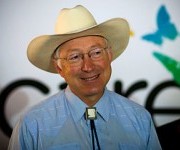 Photo: Mike DisharoonKen Salazar
Photo: Mike DisharoonKen Salazar
Secretary of Interior | interior.gov
The former Colorado senator got mixed reviews from enviros when he was nominated, and he’s still getting them. He got cheers for withdrawing oil-shale leases on tens of thousands of acres in Colorado, Utah, and Wyoming. He also got a gold star for scrapping the Bush administration’s offshore leasing plan. But he has not written off offshore drilling entirely and is reportedly at work on a new offshore-drilling plan.
Salazar got a thumbs-down from enviros for upholding the Bush administration’s policy on polar bears. The bears will continue to be considered a threatened species, since climate change is melting their Arctic habitat, but they won’t get the protections from oil and gas exploration that a declaration as “endangered” would give them.
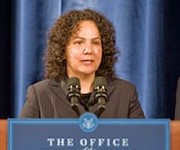 Photo: change.govNancy Sutley
Photo: change.govNancy Sutley
Chair of the White House Council on Environmental Quality | CEQ site
Nancy Sutley came to the Obama administration from the Los Angeles mayor’s office. She has promised to be the “voice for the environment” within the White House, and said she “will play an important role in coordinating the efforts of the federal government” on environmental policy, but her work is largely behind the scenes.
She has pledged that Obama and his administration are willing to stake their political capital on passing a climate bill.
Watch a video interview with Sutley by Grist’s Amanda Little.
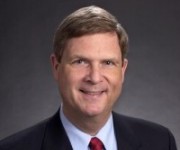 Tom Vilsack
Tom Vilsack
Secretary of Agriculture | usda.gov
Obama’s decision to appoint the former Iowa governor to head the Agriculture Department was blasted by some in the green movement who believe Vilsack is beholden to the industrial agriculture interests that are deeply rooted in his home state. So far, however, the ag secretary has avoided significant controversy, though USDA is working to influence how climate legislation governs farmers and the ethanol industry.
Vilsack has said he believes farm and forestry operations should earn carbon credits under a national climate program (a view in synch with Big Ag), with his department providing the necessary oversight. Then there’s the question of how EPA will measure biofuels’ impact on offsetting carbon dioxide emissions — a complicated issue that promises to leave either farmers or EPA scientists angry in the end.
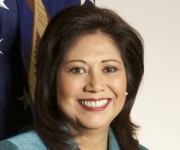 Photo: dol.govHilda Solis
Photo: dol.govHilda Solis
Secretary of Labor | dol.gov
Hilda Solis, Obama’s green-jobs-loving labor secretary, has been a low-key figure thus far, though she has spoken publicly about the administration’s desire to create millions of jobs in the renewable-energy and energy-efficiency sectors. Before joining the administration, she represented California’s 32nd Distract in the House and was a key player in getting the Green Jobs Act passed in 2007.
The Labor Department recently announced that it is partnering with the Department of Housing and Urban Development to spend funds from the economic recovery act to train and employ residents of public housing in green jobs.
Get involved in the fight against climate change via Grist’s Climate Citizens project.
